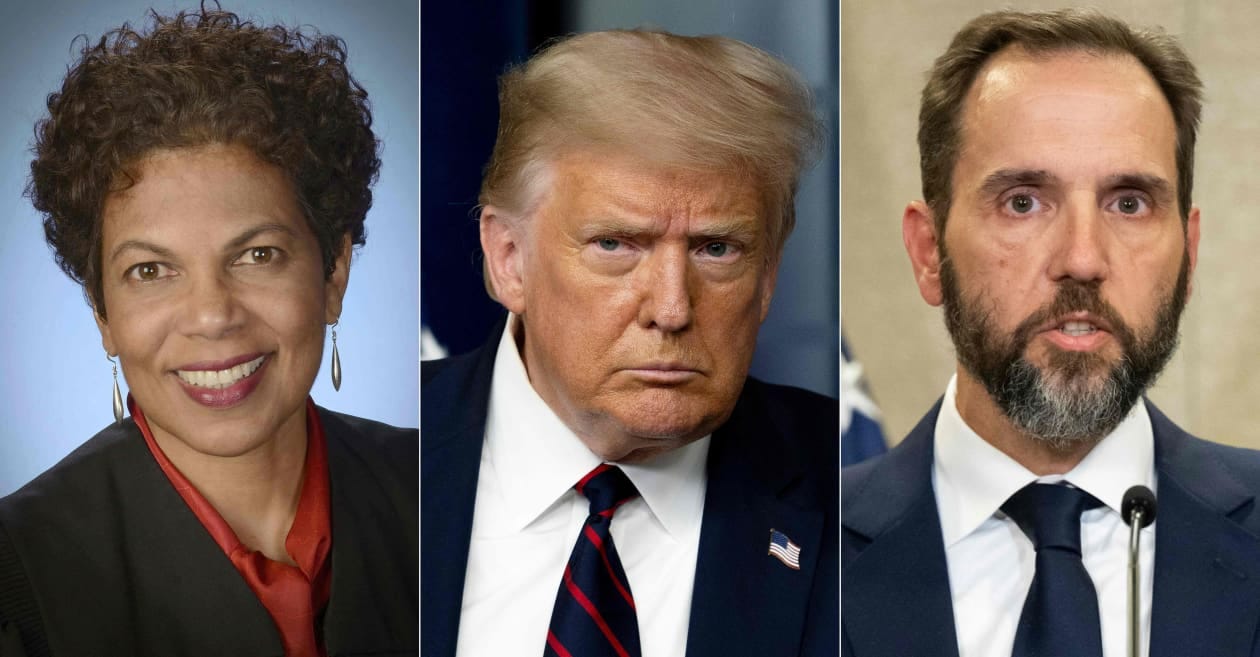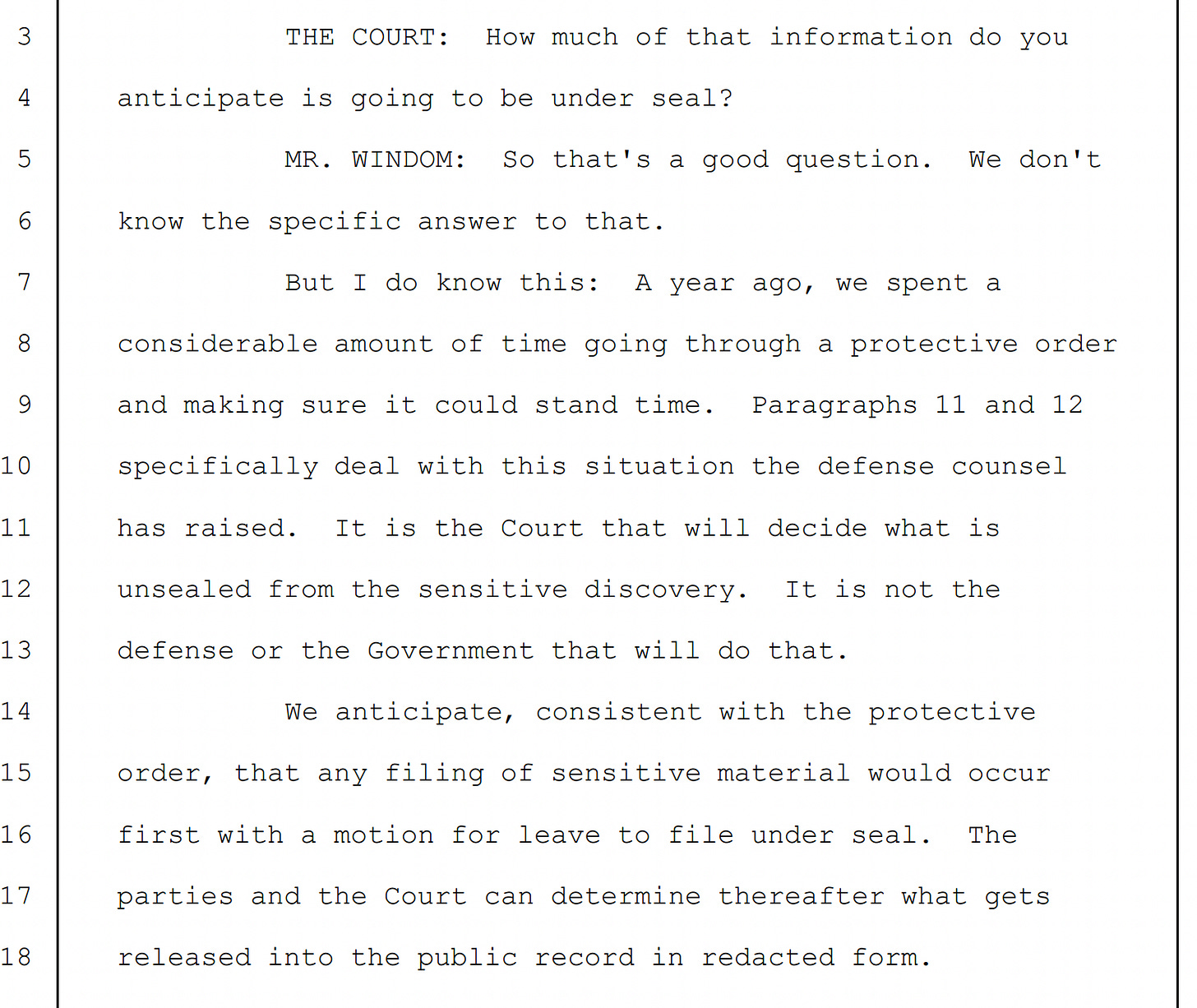A Real Judge
After months of watching Judge Aileen Cannon botch a simple, straightforward case, it was a relief to see Judge Tanya Chutkan in action today. Not actually see, of course, because this is federal court where cameras aren’t allowed (but should be). I’ve reviewed a full transcript and talked with folks who were in the courtroom.
Today’s event was a scheduling conference, not a hearing to dispose of substantive matters, but the pace and ease with which Judge Chutkan navigated the issues was reassuring. It’s clear that in her mind, this is a case like any other, where a criminal defendant is entitled to all the due process the Constitution provides him with, but no special treatment because he’s a former president and a current candidate for the job. In one key exchange, Trump lawyer John Lauro, trying to justify delaying any meaningful activity in the case until after the election to keep information about it away from the public, said, “We’re talking about the presidency of the United States.” “I’m not talking about the presidency of the United States; I’m talking about a four-count criminal indictment,” Judge Chutkan responded.
Discussing the calendar was revelatory. It’s clear the parties have very different goals at this stage.
Trump: Delay, delay, delay.
The Special Counsel: Tee up all of the issues surrounding presidential immunity at once to ensure Trump only gets one more pre-trial appeal.
There’s also a big unknown. Does the government have new evidence? Is there one or more new cooperating witnesses with tea to spill? Perhaps one of the former Trump lawyers who has pled guilty in one of the state fake elector prosecutions? The Judge has to review the government’s charges, allegations, and evidence in light of the Supreme Court’s decision on presidential immunity, which means the government is going to be revealing additional information about its case.
But before you get too excited, it’s likely that some, if not all, of the information will remain sealed, filed pursuant to the protective order in this case. Expect the government to ask for permission to file under seal with proposed redactions for public filing. Thomas Windom, one of the prosecutors, confirmed this would likely be their approach.
That means we may not learn much before trial about what is in all of the exhibits, grand jury transcripts, FBI interview reports, and so forth that the Special Counsel teased it would be presenting to the court. It was clear in today’s hearing that both sides anticipate submitting all of this in briefs, at least initially. A hearing can be held if the Judge has any outstanding questions.
As we discussed last week, one of the most important outstanding issues is whether the government can introduce evidence that Donald Trump pressured Mike Pence to prevent certification of the election results on January 6. Today, the government said that they will argue that any presumption of immunity that might apply to Trump’s interactions with Pence can be overcome. This lines up with the Supreme Court’s assessment that conduct in the outer perimeter of official business is presumptively immune, but the government could overcome the presumption by showing that basing a prosecution on that conduct wouldn’t interfere with the functioning of the presidency. And here, it seems logical that they can demonstrate them. It’s hard to imagine how the presidency is impaired if a former occupant of that office is prosecuted for trying to get his running mate to interfere with the lawful outcome of the election—if that’s even official conduct, it’s at the outer edge of the outer edge of the periphery. But, of course, the Supreme Court, which was very hospitable to Trump in round one will get a second crack at the issue when Trump appeals whatever decision Judge Chutkan reaches.
Windom said that as to the remaining criminal conduct alleged in the indictment, prosecutors will argue that it is private and not subject to immunity.
The government told the court in its filing last Friday that it wanted to file a brief explaining why its new indictment can proceed despite the immunity decision. Trump objected to that, saying he should get to file his motion to dismiss on immunity grounds first, although based on the schedule his lawyers proposed, he’s wasn’t in any hurry to do that. Late today, Judge Chutkan issued her scheduling order, and she came down on the government’s side here, ordering them to file their opening brief by September 26. Trump’s response and his motion to dismiss are due on October 17, and the government’s reply is due on Halloween.
Decisions about scheduling matters like this are up to judges. But it’s still odd that Trump objected to this plan. His lawyers devoted a great deal of time to arguing that they needed more discovery from the government so they could file their immunity motion—that was their justification for delay. The government repeatedly said that it had already turned over all of the discovery Trump was entitled to.
Here’s the oddity: Trump’s lawyers, who said they want to know more about the government’s case before they file their motion challenging it, objected to the government filing a brief telling them all about the government’s case. The government in essence was offering to give Trump even more discovery than the rules require them to, because they need to lay out their evidence so the Judge can evaluate the immunity issue. But Trump’s lawyers said they didn’t want that.
Weird.
It doesn’t make sense for Trump’s team to object to the government providing them with all of the information they were seeking, unless, the Trump team’s goal is to put everything off for as long as possible, certainly until after the election. So, apparently, that’s the goal.
Fortunately, Judge Chutkan saw through it. Why can’t you finish up with any discovery you want while the Special Counsel is writing their brief, she asked Trump’s lawyers? They told her they needed to see everything first—never mind that the government represented it has already turned everything over. “We can all walk and chew gum at the same time,” Judge Chutkan said in the hearing. So now, the government has a few weeks to write its brief and then Judge Chutkan can get back to work.
She clearly was ready to do that.
In back and forth with the lawyers over how to proceed, Lauro told her that as he read the indictment, the Supreme Court required them to deal with immunity “forthwith.” “Under your schedule, we wouldn’t even begin briefing immunity until December,” Judge Chutkan said. “Why?” When Lauro tried to appeal to the need to keep sensitive material out of public view before the election, the response was a sharp one. “This Court is not concerned with the electoral schedule,” she said. “Yes, there's an election coming. But the sensitive time that you're talking about, if you're talking about the timing of legal issues and the timing of evidentiary issues in relation to when the election is, that's not -- that's nothing I'm going to consider.”
There was also a dispute that wasn’t related to immunity. Trump wants to file a motion to dismiss the prosecution, arguing that Jack Smith’s appointment as Special Counsel is unconstitutional. That’s the same argument Judge Cannon used to dismiss the classified documents case in Florida. But Trump has two problems. First, he’s well past the deadline Judge Chutkan established for filing motions, and there’s no good reason he couldn’t have filed on time. And second, there is binding precedent in the Circuit—Judge Chutkan doesn’t have the authority to ignore it—that says the appointment was proper.
Here, Judge Chutkan showed that she is unbiased and fair. She could have denied Trump’s request outright for missing the deadline, but instead, she’s given him leave to request permission to file his motion. His lawyers will likely do that. Even though the outcome in front of Judge Chutkan isn’t in doubt—she’ll deny the motion—they have to file to preserve the issue for appeal, and the whole ballgame here on their side will be getting this appointment issue in front of the Supreme Court and asking them to decide it.
Judge Chutkan was both fair and efficient today. Both sides got something that they wanted. And she was prompt, issuing her scheduling order based on what she’d heard from the parties not weeks down the road, but later in the day.
There are other motions and other issues still to be decided, but looming over everything else in this case is this next round of decisions about presidential immunity and the inevitable appeals, likely reaching the Supreme Court, before there is a final ruling on whether, and if so on what charges, Donald Trump will face trial.
“We can’t even contemplate a trial date due to the looming appellate issues,” Judge Chutkan said.
The reality here is disturbing. If Trump wins, it’s a near certainty his attorney general will dismiss the prosecutions against him. That, if it were to happen, would be an outrage and an affront to the rule of law, and we must make sure we don’t permit it to become a normal, easily accepted idea. It would be grounds for impeachment if the Republican Party retained any remnants of its former self. It’s shocking that there are people who would even consider voting for Trump knowing that his strategy for his criminal case is to try to keep it from ever coming to trial. But here we are in September of 2024.
Still, slow progress is better than no progress. And today, we saw a Judge who knows how to move a case forward. Trump faces deadlines throughout the campaign. And that’s something he can’t appeal and can’t alter. He may complain about it, but like any other defendant, he has to do what the Judge orders.
So, a little good news. I’m glad you’re here with me at Civil Discourse for it! If you’re not already a paid subscriber, please consider becoming one. Your support lets me devote the time and resources necessary for this work.
We’re in this together,
Joyce





The bottom line is that no court is going to save us from Trump. We have to do that ourselves by delivering an unassailable majority to VP Harris, as well as control of the House and the Senate. If we do the work to make those things happen, all of Trump's delaying actions will not amount to a hill of a beans, and he will have to face the outcome of the multiple trials for the variety of felonies he is accused of, as well as the sentencing for the felonies he has already been found guilty of. It is up to us.
AG Merrick Garland should have started working on these criminal proceedings against TRump much earlier than he did. It seems as if he was trying not to seem partisan when this isn't a partisan issue. It's a criminal issue. It's frustrating and infuriating to watch TRump not being held accountable for the egregious crimes he's committed against We the People. Trying to steal an election and inciting violence is not okay.